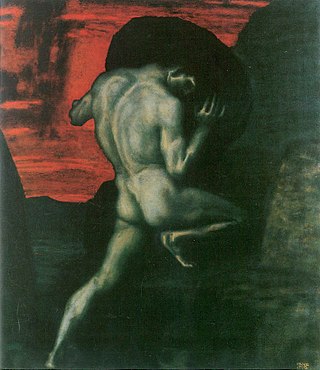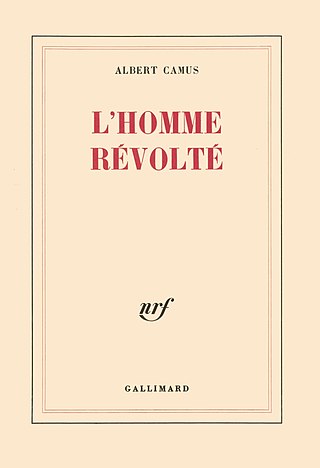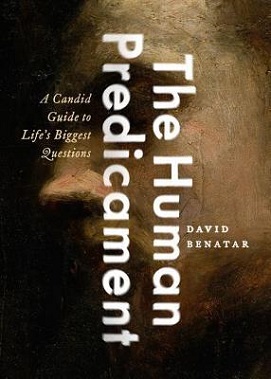
Existentialism is a form of philosophical inquiry that explores the issue of human existence. Existentialist philosophers explore questions related to the meaning, purpose, and value of human existence. Common concepts in existentialist thought include existential crisis, dread, and anxiety in the face of an absurd world and free will, as well as authenticity, courage, and virtue.

The meaning of life pertains to the inherent significance or philosophical meaning of living. There is not a definitive answer, and thinking or discourse on the topic is sought in the English language through the question, "What is the meaning of life?". There have been many proposed answers to these questions from many different cultural and ideological backgrounds. The search for life's meaning has produced much philosophical, scientific, theological, and metaphysical speculation throughout history. Different people and cultures believe different things for the answer to this question. Opinions vary on the usefulness of using time and resources in the pursuit of an answer. Excessive pondering can be indicative of, or lead to, an existential crisis.
Nihilism is a family of views within philosophy that rejects generally accepted or fundamental aspects of human existence, such as knowledge, morality, or meaning. The term was popularized by Ivan Turgenev and more specifically by his character Bazarov in the novel Fathers and Sons.

Peter Wessel Zapffe was a Norwegian philosopher, author, artist, lawyer and mountaineer. He is often noted for his philosophically pessimistic and fatalistic view of human existence. His system of philosophy was inspired by the German philosopher Arthur Schopenhauer, as well as his firm advocacy of antinatalism. His thoughts regarding the error of human life are presented in the essay "The Last Messiah". This essay is a shorter version of his best-known work, the philosophical treatise On the Tragic.

The Myth of Sisyphus is a 1942 philosophical essay by Albert Camus. Influenced by philosophers such as Søren Kierkegaard, Arthur Schopenhauer, and Friedrich Nietzsche, Camus introduces his philosophy of the absurd. The absurd lies in the juxtaposition between the fundamental human need to attribute meaning to life and the "unreasonable silence" of the universe in response. Camus claims that the realization of the absurd does not justify suicide, and instead requires "revolt". He then outlines several approaches to the absurd life. In the final chapter, Camus compares the absurdity of man's life with the situation of Sisyphus, a figure of Greek mythology who was condemned to repeat forever the same meaningless task of pushing a boulder up a mountain, only to see it roll down again just as it nears the top. The essay concludes, "The struggle itself towards the heights is enough to fill a man's heart. One must imagine Sisyphus happy."

Absurdist fiction is a genre of novels, plays, poems, films, or other media that focuses on the experiences of characters in situations where they cannot find any inherent purpose in life, most often represented by ultimately meaningless actions and events that call into question the certainty of existential concepts such as truth or value.
"The Last Messiah" is a 1933 essay by the Norwegian philosopher Peter Wessel Zapffe. One of his most significant works, this approximately 10 pages long essay would later be expanded upon in Zapffe’s book, On the Tragic, and, as a theory describes a reinterpretation of Friedrich Nietzsche's Übermensch. Zapffe believed that existential crisis or angst in humanity was the result of an overly evolved intellect, and that people overcome this by "artificially limiting the content of consciousness."

Absurdism is the philosophical theory that the universe is irrational and meaningless. It states that trying to find meaning leads people into a conflict with the world. This conflict can be between rational man and an irrational universe, between intention and outcome, or between subjective assessment and objective worth, but the precise definition of the term is disputed. Absurdism claims that existence as a whole is absurd. It differs in this regard from the less global thesis that some particular situations, persons, or phases in life are absurd.

In conventional usage, boredom, ennui, or tedium is an emotion characterized by uninterest in one's surrounding, often caused by a lack of distractions or occupations. Although, "There is no universally accepted definition of boredom. But whatever it is, researchers argue, it is not simply another name for depression or apathy. It seems to be a specific mental state that people find unpleasant—a lack of stimulation that leaves them craving relief, with a host of behavioral, medical and social consequences." According to BBC News, boredom "...can be a dangerous and disruptive state of mind that damages your health"; yet research "...suggest[s] that without boredom we couldn't achieve our creative feats."

The Rebel is a 1951 book-length essay by Albert Camus, which treats both the metaphysical and the historical development of rebellion and revolution in societies, especially Western Europe.

Nausea is a philosophical novel by the existentialist philosopher Jean-Paul Sartre, published in 1938. It is Sartre's first novel.

In psychology and psychotherapy, existential crises are inner conflicts characterized by the impression that life lacks meaning or by confusion about one's personal identity. Existential crises are accompanied by anxiety and stress, often to such a degree that they disturb one's normal functioning in everyday life and lead to depression. This negative attitude towards life and meaning reflects various positions characteristic of the philosophical movement known as existentialism. Synonyms and closely related terms include existential dread, existential vacuum, existential neurosis, and alienation. The various aspects associated with existential crises are sometimes divided into emotional, cognitive, and behavioral components. Emotional components refer to the feelings they provoke, such as emotional pain, despair, helplessness, guilt, anxiety, or loneliness. Cognitive components encompass the problem of meaninglessness, the loss of personal values or spiritual faith, and reflections about one's own mortality. Outwardly, existential crises often express themselves in addictions, anti-social and compulsive behavior.
Emptiness as a human condition is a sense of generalized boredom, social alienation, nihilism and apathy. Feelings of emptiness often accompany dysthymia, depression, loneliness, anhedonia, despair, or other mental/emotional disorders, including schizoid personality disorder, post-traumatic stress disorder, attention deficit hyperactivity disorder, schizotypal personality disorder and borderline personality disorder. A sense of emptiness is also part of a natural process of grief, as resulting death of a loved one, or other significant changes. The particular meanings of "emptiness" vary with the particular context and the religious or cultural tradition in which it is used.
Amor fati is a Latin phrase that may be translated as "love of fate" or "love of one's fate". It is used to describe an attitude in which one sees everything that happens in one's life, including suffering and loss, as good or, at the very least, necessary.
The proposition that existence precedes essence is a central claim of existentialism, which reverses the traditional philosophical view that the essence of a thing is more fundamental and immutable than its existence. To existentialists, human beings—through their consciousness—create their own values and determine a meaning for their life because the human being does not possess any inherent identity or value. That identity or value must be created by the individual. By posing the acts that constitute them, they make their existence more significant.
Atheistic existentialism is a kind of existentialism which strongly diverged from the Christian existential works of Søren Kierkegaard and developed within the context of an atheistic world view. The philosophies of Søren Kierkegaard and Friedrich Nietzsche provided existentialism's theoretical foundation in the 19th century, although their differing views on religion proved essential to the development of alternate types of existentialism. Atheistic existentialism was formally recognized after the 1943 publication of Being and Nothingness by Jean-Paul Sartre and Sartre later explicitly alluded to it in Existentialism is a Humanism in 1946.
This is a list of articles in continental philosophy.

The Human Predicament: A Candid Guide to Life's Biggest Questions is a philosophy book by David Benatar, which makes a case for philosophical pessimism, published by Oxford University Press in 2017. The book presents Benatar's views on a range of philosophical issues, arguing, among other topics, that having children is immoral, that death is bad despite much of human life being spent in suffering, and that suicide may be a morally justified action more often than is commonly assumed. The Human Predicament has been favorably compared to The Conspiracy Against the Human Race by Thomas Ligotti, the worldview presented in Ecclesiastes, and the works of philosopher Thomas Metzinger.

Philosophical pessimism is a family of philosophical views that assign a negative value to life or existence. Philosophical pessimists commonly argue that the world contains an empirical prevalence of pains over pleasures, that existence is ontologically or metaphysically adverse to living beings, and that life is fundamentally meaningless or without purpose. Philosophical pessimism is not a single coherent movement, but rather a loosely associated group of thinkers with similar ideas and a resemblance to each other. Their responses to the condition of life are widely varied. Philosophical pessimists usually do not advocate for suicide as a solution to the human predicament; though many favour the adoption of antinatalism, that is, non-procreation.
Philosophical pessimism is a philosophical school critical of existence.











